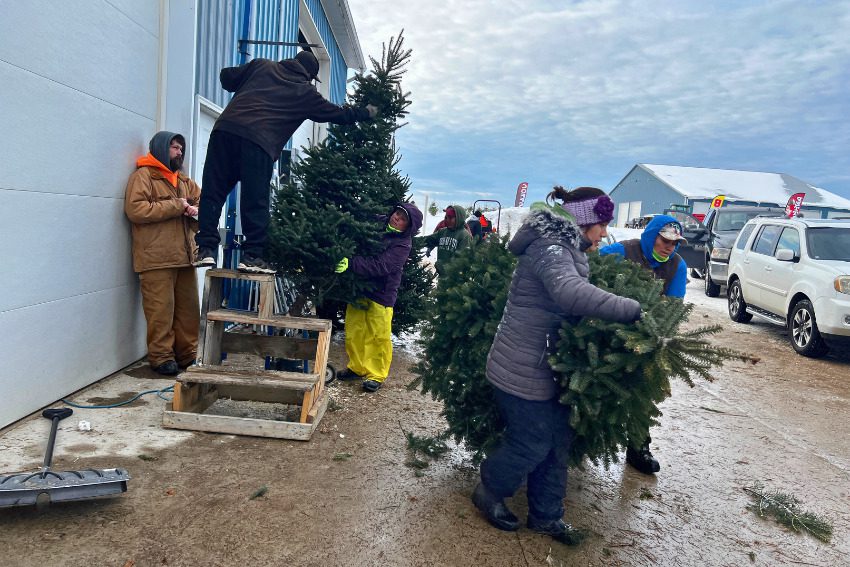
Photo Illustration/Jim Watson/CQ-Roll Call/Bill Clark/AFP/Getty Images
Republicans’ Project 2025 agenda aims to enact a far-right agenda that would hurt all Michiganders, especially those living in rural communities, according to a new report.
MICHIGAN—A new report shows how the Republican-led Project 2025 agenda could gut federal checks and balances, give unprecedented power to Donald Trump, and carry some significant consequences for rural communities nationwide.
The report was released this month by the Center for American Progress (CAP), and it includes a point-by-point analysis detailing how the 900-page plan for a second Trump term would uproot daily life in small towns across Michigan and “devastate rural America in many ways.”
Here’s the deal:
The Project 2025 agenda ultimately hinges on Trump and Republican lawmakers taking control of Congress and the federal government in this year’s election—and it proposes clear, detailed plans to take power away from the American people, namely to give conservative politicians, judges, and corporations more control over their everyday lives, according to the CAP report.
The report also details seven ways in which Project 2025 threatens rural communities:
1.) Putting farmers at increased risk of financial harm and stunting their ability to grow
Project 2025 proposes eliminating federal Agricultural Risk Coverage and Price Loss Coverage programs, which provide financial support to farmers and protect them from substantial drops in crop prices. The programs can serve as vital economic safety nets for millions of farmers.
Those programs are authorized through federal Farm Bills, and have been extended under legislation signed by President Joe Biden. And federal data shows that farmers in several dozen Michigan counties have benefited through the programs in recent years—particularly corn and soybean farmers in the Upper Peninsula, as well as grain sorghum farmers across the state.
Project 2025 also proposes a plan to “ban farmers” from receiving those payments the same year they receive crop insurance indemnities, which would essentially undermine farmers’ ability to plant their next crop and make it much harder for smaller, family-owned farms to access business funding through Farm Service Agency loans, according to the CAP report.
That includes the federal Livestock Indemnity Program, which provides benefits to farmers for livestock deaths; the Tribal Land Acquisition Program, which provides loans to Indian tribes for purchasing private land within their respective reservations; the Grassland Reserve Program, Emergency Farm Loans; the Conservation Reserve Program; and a wide array of other crop assistance initiatives and other programs that provide direct operating assistance to farmers.
Additionally, Project 2025 calls for eliminating crop export promotion programs, such as the Market Access Program and Foreign Market Development Program, according to the report. Collectively, those two programs awarded more than $200 million to farmers this year.
2.) Eliminating child care options
Project 2025 includes detailed plans to eliminate the Head Start program, which provides access to no-cost child care, among other services, for about 780,000 low-income children across the country—including about 28,000 low-income children living in Michigan.
And with about 60% of rural Americans living in so-called “child care deserts,” where demand for affordable child care dramatically outpaces the supply, Project 2025’s plan to eliminate the federal Head Start program would have a clear, disproportionate impact on rural communities.
A previous CAP analysis found that Head Start accounted for up to 59% of all child care slots in rural communities across 10 states. In Michigan, more than 1 in 3 child care slots that are currently available in rural communities could be eliminated by cutting the Head Start program.
3.) Defunding public schools while leaving rural students with few alternative options
One of the most extreme aspects of Project 2025 calls for eliminating the US Department of Education altogether—including Title I, which provides funds to ensure schools serving rural, low-income students have additional resources beyond what’s available through local taxes.
Ending Title I would eliminate about 5,400 teaching positions across Michigan, which currently serve about 89,000 students statewide, according to the Center for American Progress.
Project 2025 also details a plan to divert those funds from public schools to support a private school voucher model, like those backed by right-wing billionaire Betsy DeVos.
But vouchers don’t actually provide “universal school choice” for students living in rural areas— namely because rural families have fewer access points to schools compared to urban and suburban students, according to a report from the National Coalition for Public Education.
While 92% of urban families have access to one or more private schools within five miles of their home, only 34% of rural families have access to such a choice, according to the report.
4.) Eliminating free school meals that disproportionately benefit rural students
Project 2025 aims to end the federal Community Eligibility Provision, which provides free school meals to those attending schools where at least 25% of students come from low-income families and are eligible for free- or reduced-price school meals. According to the CAP report, eliminating that funding could eliminate those meals for as many as 20 million students attending more than 40,000 schools in the US—including about 3,000 schools in Michigan.
The CAP report also bills this portion of Project 2025 as an “acute threat” to rural communities. Of the counties with the highest rates of child food insecurity, 86% are rural, research shows.
5.) Undermining recovery efforts from natural disasters in rural areas, which are more susceptible to extreme weather events
This summer, hundreds of Michigan businesses and residents were offered access to direct, low-interest federal loans to help rebuild—and recover—after a devastating tornado ripped through Kalamazoo, Allegan, Barry, Branch, Calhoun, St. Joseph, and Van Buren counties.
That funding was provided through the Small Business Administration’s direct lending program, which serves as the federal government’s largest source of disaster recovery funds for survivors—especially in rural communities that often lack access to other federal grants.
Project 2025 proposes a plan to end the program altogether.
And because small towns frequently lack the manpower, financial resources, and time to pursue other forms of assistance, that could leave rural Michiganders (and businesses) to fend for themselves after severe weather and natural disasters like tornadoes, droughts, and floods.
The program serves every state in the country—including Michigan, where more than 1,200 grants have been awarded (totaling more than $47 million) over the last three years alone.
According to Project 2025’s own analysis, 90% of this disaster aid also serves individuals such as homeowners, as opposed to small businesses. So, while the program is a key resource for helping local economies bounce back, the loans can play an even more critical role in helping individuals and families begin the long road to recovery, according to the latest CAP analysis.
6.) Gutting rural connectivity
Project 2025 calls for repealing all unspent funds provided through the Biden-Harris administration’s Bipartisan Infrastructure Law—which includes funding that has (and is set to continue) boosting major infrastructure projects in rural communities across the country.
Beyond upgrading roads, bridges, tunnels, airports, ports, and waterways, federal funding from the Bipartisan Infrastructure Law has helped advance new clean energy projects in Michigan, as well as provided $65 billion to deploy broadband internet connections in all communities nationwide, as well as make internet access more affordable, particularly for rural Americans.
Prior to the law, small towns were nearly 15 times more likely to lack access to reliable broadband compared to urban areas. According to the CAP report, repealing those investments would “disproportionately harm people living, working, or going to school in rural America.”
7.) Limiting air travel service in rural areas
Air travel could also become a lot more expensive and inconvenient for rural communities in Michigan, should Trump be elected and enact the Project 2025 agenda.
Specifically, the right-wing playbook calls for ending the Essential Air Service (EAS), a federal program that ensures rural Americans have access to air travel by subsidizing the cost of service in smaller towns and communities that would otherwise go without air service.
The program has enabled rural communities to attract and keep businesses and jobs and made it easier for residents to access work opportunities, medical appointments, and visit with family.
As of this year, the EAS program supports air service to around 175 rural communities across the United States. In Michigan, that includes (but is not limited to) the Alpena County Regional, Chippewa County International, Delta County, Ford, Gogebic-Iron County, Houghton County Memorial, Manistee County Blacker, Muskegon County, and Pellston Regional airports.
The program specifically serves communities where commercial airlines typically don’t operate due to a lack of traffic. By providing millions of dollars in grants to these airports, the EAS program ensures that costs stay low for residents and key rural routes continue to be served.
Without the subsidies, rural Michiganders could be forced to shoulder the difference with less affordable ticket prices. Some small-town airports could lose air service altogether or close, as airlines would be free to abandon smaller markets that might not guarantee high profit margins.
READ MORE: 10 things Michiganders should know about Project 2025
For the latest Michigan news, follow The ‘Gander on Twitter.
Follow Political Correspondent Kyle Kaminski here.
Support Our Cause
Thank you for taking the time to read our work. Before you go, we hope you'll consider supporting our values-driven journalism, which has always strived to make clear what's really at stake for Michiganders and our future.
Since day one, our goal here at The 'Gander has always been to empower people across the state with fact-based news and information. We believe that when people are armed with knowledge about what's happening in their local, state, and federal governments—including who is working on their behalf and who is actively trying to block efforts aimed at improving the daily lives of Michigan families—they will be inspired to become civically engaged.


Working folks build food solutions, while Congress slashes SNAP
On Thursday nights, I walk a few blocks along my neighborhood’s cracked sidewalks to the People’s Market. Once a week, an empty lot becomes a...

Gwen Frisbie-Fulton: ‘The people closest to the problem are often the ones who can find the solution’
About two years ago, tents started to show up in my neighborhood along the creek beds and in small stands of trees. Most only became visible when...

A love letter to the working class, from Gwen Frisbie-Fulton
It started in the back seat of my family’s Jeep Cherokee, the one with the broken AC and vinyl seats that stuck to my thighs in the late summer...

Fresh food, stronger farms: Michigan invests millions to support local agriculture
A new ‘Farm-to-Family’ grant program aims to connect Michigan farmers with more consumers, boost local economies, and build a stronger food system....

Rooted in Tradition: How Michigan’s Christmas tree industry is keeping the holiday spirit alive
Family farms—and traditions—help Michigan produce more Christmas trees than almost every other state in the country. GOBLES—Under a clear December...





